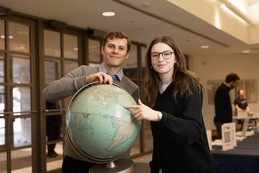Some Truths about Autism and Vaccines
Guest Opinion
By Isiah Smith, Jr. | April 12, 2025

In 1998, the highly respected scientific journal, The Lancet, published a study that sparked the theory that vaccines cause autism. In 2010, the article was retracted after the editors discovered that the conclusions had been based on fraudulent data from a study involving only 12 children.
The Lancet wrote that the 1998 paper published by Dr. Andrew Wakefield and his colleagues “are incorrect, contrary to the findings of an earlier investigation.” Wakefield and his co-authors claimed that they investigated “a consecutive series” of 12 children referred to the Royal Free Hospital and School of Medicine with chronic enterocolitis (inflammation of the intestines) and regressive developmental disorder (in which a child loses their ability to use previously established skills, often seen in conditions like autism).
The study’s authors concluded that the vaccine had caused the children’s autism.
Years later, Britain’s General Medical Council determined that Wakefield’s team had selectively chosen the subjects. Furthermore, funding for his research came from lawyers representing parents who were suing vaccine manufacturers. The council concluded that Wakefield acted unethically and demonstrated a “callous disregard” for the science and the welfare of the children involved.
In the universe of scientific research and writing, the discovery of fraud in the scientific method is usually fatal. But as we will see, research published in respectable journals often takes on a life of its own and lives on even after it should have died.
Ultimately, the widely-shared study tarnished vaccines’ reputation and turned tens of thousands of parents globally against measles, mumps, and rubella (MMR) vaccinations.
In the study, Wakefield indicated that the parents of eight of the 12 children linked the loss of acquired abilities, such as language skills, to the MMR vaccination. The authors concluded that there are “possible environmental triggers” (the vaccine) related to the onset of gastrointestinal issues and developmental regression.
When the general media picked up the original article, the findings were fueled by speeches and public appearances in which Wakefield recommended single vaccines instead of the combined MMR. Many parents searching for a clear cause for their children’s difficulties seized upon the apparent link between routine vaccination and autism, according to Canadian researchers who praise the retraction.
Unfortunately, the damage has already been done; The Lancet’s past reputation meant that the vaccine-autism theory continued to fuel and support conspiracy theories that refuse to die.
Given the copious scientific studies that refute the theory, why do people continue to believe it?
One reason may be that after receiving an autism diagnosis, parents often seek ready answers and may cling to anything that offers clarity. Additionally, the absence of definitive answers about causation makes concerned parents vulnerable to conspiracy theories spread by unethical individuals, sometimes for financial gain.
Nothing in the world is more frightening to humans, especially parents, than the unknown, as humans naturally crave certainty. The unknown suggests that things are beyond our control, often triggering feelings of vulnerability and powerlessness.
Parasitic politicians understand this all-too-common facet of human vulnerability better than most, which is why they frequently perpetuate fear and offer simple solutions to complex problems.
Why bring this topic up today? First, April is Autism Acceptance Month, which, per the Autism Society of America, “celebrates and honors the experiences and identities of Autistic individuals. It emphasizes understanding, inclusion, and support, moving beyond awareness towards meaningful acceptance.”
Second, news broke at the end of March that the Department of Health and Human Services (HHS) has ordered a study looking for a link between immunizations and autism. The researcher chosen is David Geier, who has neither a medical degree nor a credible science background. The researcher has also been disciplined by the State of Maryland’s Board of Physicians for practicing medicine without a license. All the foregoing suggests the results of this “scientific exploration” have been preordained.
We would be remiss if we failed to address the fact that individuals with autism can, and often do, thrive.
Temple Grandin, screenwriter, zoologist, consultant, autism activist, and biologist, our contemporary, has accomplished much more than many neurotypical individuals. In his recent memoir, Source Code, Bill Gates writes that “If I were growing up today, I probably would be diagnosed on the autism spectrum. During my childhood, the fact that some people’s brains process information differently from others wasn’t widely understood.”
I am personally acquainted with an exceptionally highly educated person who has been diagnosed on the neurodivergent spectrum. This person has always been highly productive and immensely successful.
Don’t we all exist on a continuum of human possibility and experience?
Isiah Smith, Jr. is a retired government attorney.
Trending

Michigan’s Marijuana Tax at Work
Cannabis has become a big business in northern Michigan, and local governments are putting tax dollars earned from dispensar… Read More >>
California Sober: Why People Are Switching from Alcohol to Weed
They call it “California sober.” Generally speaking, this term applies to folks who use marijuana but abstain f… Read More >>
The Legacy of Student Activism
“It’s a physical letter to your representative,” Alex Tank says when asked to define the word “prote… Read More >>


